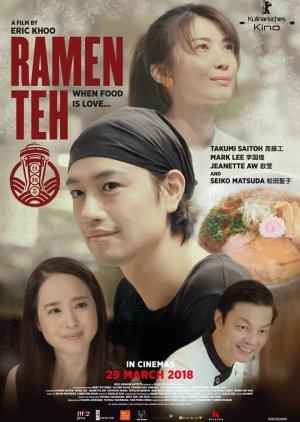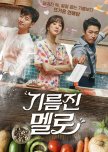
Food that heals
Ramen Teh aka Ramen Shop was a sweet, nostalgic look at the romance of a young Japanese man’s parents when they lived in Singapore. Masato set off in search for familial answers and a recipe that was inexorably tied to his mother. If you enjoy films with food, Ramen Teh may leave you hungry as Masato cooked his way through his mother’s recipes and visited the Singaporean food scene.Masato works at his father’s popular ramen shop in Takasaki. Ever since his mother’s death when he was ten, he and his father have not been close. When his father suddenly dies Masato discovers his mother’s journal amongst his father’s belongings. Written in Mandarin, he’s unable to read it. Feeling a gaping hole in his heart, Masato heads to Singapore to find his mother’s brother who owns a small restaurant. Not only does he want help translating the journal, but he dearly longs for his mother’s Bak Kut Teh, a pork rib soup he’s never been able to duplicate. Miki, an on-line friend and Japanese food blogger living in Singapore, meets up with him and translates the journal. The journal includes not only his mom’s thoughts, but also her recipes. Masato finds his uncle who is overjoyed that his nephew has returned, but his grandmother will have nothing to do with him. Masato will test whether food can heal a broken heart and a broken relationship.
This film was very simple and predictable, but that doesn’t mean it wasn’t heartwarming. The story often flashbacked to his parents’ romance and their early married days when Masato was a child. Food figured prominently both in the past and present. It was also a nice travelogue as Masato visited the places from his parents’ photographs in Singapore. After discovering the reason for his grandmother’s hatred of the Japanese, Masato visited a museum that had a display detailing the atrocities committed by the Japanese during WWII. Shaken after learning the disturbing details from the war, he realized winning over his grandmother might not be possible. But Masato had secret weapons on his side--being a grandchild and developing a special ramen recipe to weaken her resolve.
Food, especially beloved family recipes, evoke strong emotions, it is a connection to family and friends, binding relationships through taste and life-giving sustenance. Even the familiar smell of a simple meal can transport a person to a happier place and awaken faded memories. Masato traveled in search of family, a recipe, and that which was thought lost, creating something very special along the way. While Ramen Teh had a tendency to meander, the final course was the pièce de resistance and enormously satisfying.
18 August 2025
Was this review helpful to you?

This review may contain spoilers
Watch this for my Alphabet challenge. This film is about reconnecting with family members who have long been out of touch and how to blend two cultures together through a single dish.Once again, MDL’s summary is absolutely on point. So, I’ll not bore you with another summary, just read the summary provided by MDL.
What I like:
+ Interesting to see the family dynamic of Masato. How he managed to search and reconnect with his maternal family.
+ It’s so funny to see how easily the grandson is able to soften his strong-willed grandmother’s heart.
+ It's interesting to see Japanese people dare to walk through an exhibit that shows their brutality during World War II. And to see Masato actually show remorse—there’s something profoundly honest and reassuring about that moment.
What I don’t too like:
On the joke side, I just wish they had shown us more of the dish. Haha…
Overall this is a journey of Masato to find and reconnect with his maternal family.
Was this review helpful to you?

This review may contain spoilers
A food healing trip
I finally watched this movie a few years later and it was so good.Even though it was sometimes slow paced but in my opinion, it brought some peaceful feelings and beautiful views on cities and landscapes. It was quite interesting to see two different cultures by bringing local food, not only it was mouthwatering thanks to some dishes but also moving with historical elements between 2 countries and I didn't know about it so it educated me on this part.
I think I love everything in this movie such as the performances of the actors which I didn't know nor watch them in any other movies, the story and step by step discovering / learning with the main character the background of his parents but also his mother and her family. In addition, I myself love food and it's also important to me so I related to it, I feel connected somehow that's why I give a high rating.
It was seriously such a beautiful, heartwarming, healing, moving and comforting movie.
Lastly, thanks to this movie, I want to watch more of the director Eric Khoo but also want to check other projects of other actors, especially Takumi Saitoh's.
Was this review helpful to you?

Very lightweight food drama
A somewhat more fleshed-out drama episode, very syrupy and without any depth whatsoever. Which doesn't bother me so much, as it's a style I can enjoy beyond the general lightweight nature of the whole thing. It's not high art, but it makes for a pleasant watch on a Sunday afternoon on TV. Seiko Matsuda is still very pretty.Was this review helpful to you?

Isso foi uma grande surpresa, estive encantada com o amor e carinho que Masato tem pela comida, então de repente me vi em lágrimas sobre um passado sombrio que deixou grandes cicatrizes e separou essa família.
Tudo contado em meio a comida de forma delicada que deixa um sentimento de nostalgia. No fim todos foram unidos porque tinham em comum, a comida.
Was this review helpful to you?
la cuisine est un vecteur universel de réconciliation...
C’est un film a aller absolument voir avec le ventre bien rempli, sous peine de souffrir tout du long de la projection, car la cuisine, la nourriture, le repas sont des éléments essentiels du film. D’ailleurs je me suis mise en quête de la recette de soupe d’os de porc aussitôt finie la séance !Ce film est délicieux, chaleureux et en même temps très émouvant. Masato va comprendre bien des choses du passé de ses parents, découvrir aussi l’impact que l’occupation japonaise a eu sur les peuples conquis, chose qui n’est pas vraiment enseignée au Japon, et le choc est brutal.
L’élément le plus touchant et le plus convaincant du film est l’utilisation de la cuisine comme d’un langage à part entière permettant de franchir les douleurs du passé, la barrière de la langue, et d’apporter pardon et rédemption d’une façon charnelle, primitive et indiscutable.
C’est un pur moment de bonheur simple qui réchauffe l’âme, et le corps, si on se met ensuite aux fourneaux !
Was this review helpful to you?






































